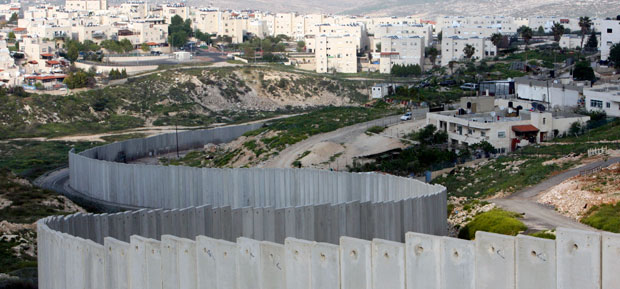Leaked papers reveal Palestinian concessions in peace talks
 Lindsey Hilsum
International Editor
Lindsey Hilsum
International Editor
Palestinian negotiators told Israel it could keep large parts of illegally occupied East Jerusalem, according to leaked documents. Lindsey Hilsum looks at what the revelations mean for a future deal.

op Palestinian officials have questioned the leaked documents which appear to show much bigger concessions than previously revealed in the Middle East peace talks.
The documents, obtained by Al Jazeera, suggest Palestinian officials agreed to Israel keeping all but one settlement in illegally-occupied East Jerusalem. The offer was rejected by Israel, according to the leaked papers.
Channel 4 News has been unable to independently verify the documents, dubbed the “Palestine Papers”.
President Mahmoud Abbas said the documents had deliberately confused the Palestinian and Israeli positions during the talks.
Al Jazeera says it has obtained 1,600 internal documents from a decade of peace talks, some of which will be published over the coming days.
Document release
The release of highly-sensitive documents could undermine the position of President Abbas, whose public declarations about Jerusalem seem to be at odds with what his officials were promising in private.
The leaked documents have sparked anger in some who fear their rights to the Holy City were being sold too cheaply.
The leaked minutes of a 2008 meeting between Palestinian, US and Israeli officials showed a senior Palestinian proposing that Israel annex all but one of its major Jerusalem settlements as part of a broad deal to end their decades-old conflict.

Martin Indyk, a former US Ambassador to Israel and an adviser to the State Department’s Middle East envoy, told Channel 4 News that the papers showed that a deal was there to be done.
“That it was not done in 2008 – which these documents are all about – had to do with the fact that Ehud Olmert – the Prime Minister of Israel who was negotiating with Abu Mazen, the Palestinian leader at the time – was indicted and basically taken out for reasons that had nothing to do with the peace process – and therefore there wasn’t a chance to consummate the deal,” he said.
“But it is clear from these documents that they were very close.”
A compromise had to be made on both sides, said Mr Indyk. “Perhaps the Palestinians will come to understand what the Israelis already understand – that if a deal is going to be made, this is pretty much what it is going to look like.”
Palestine Papers leak could fuel grassroots unrest say Chatham House experts
But top officials today discredited the documents.
“What is intended is a mix-up. I have seen them present things as Palestinian but they were Israeli…This is therefore intentional,” President Abbas said today.
Earlier, the chief Palestinian negotiator Saeb Erekat, who is quoted in the papers, went on the offensive, dismissing the documents as “a bunch of lies”.
One document quoted Erekat as telling an Israeli official: “It is no secret that …we are offering you the biggest Yerushalayim in history.” He used the Hebrew word for Jerusalem.
What next for peace?
International Editor Lindsey Hilsum asked what the papers mean about a potential end to conflict in the region.
“Much of the commentary has focused on how weak the Palestinian negotiators appear to be, a suggestion that they were selling Palestinians down the river,” she said.
“Certainly, such huge concessions would have been very unpopular among those Palestinians who would rather hang onto the hope of a better deal. But it’s exactly what the US and European powers have been pressing the Palestinians to do for many years. So why no praise for them at that time?
“Why has Tony Blair, the Middle East envoy, not spoken out how far the Palestinians were prepared to go, and criticised the Israelis for refusing to move an inch?
“Since Israel built a wall around its territory, the threat of terrorism inside Israel has been reduced to almost nil, so there’s no compelling reason for Israel to do a deal. Fatah was willing to compromise, because – it hoped – a deal would restore its legitimacy, giving it more power in the face of the challenge from Hamas, its internal opposition, which governs Gaza.
“The leak of these papers shows that there is no peace process. It seems highly unlikely now that there will be a two-state solution. The Americans and Europeans always refer to Mahmoud Abbas, Saeb Erekat and the rest of the Fatah leadership in Ramallah as “moderate”.
“That’s meant to be a compliment. It doesn’t seem to have done them any good.”
Read more of Lindsey Hilsum’s analysis on the Palestine Papers here.
<!–
–>




